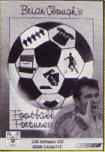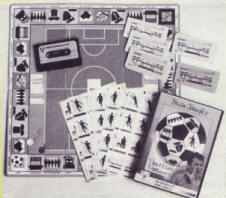|
CDS Software
£14.95 cassette
£17.95 disk
2-5 players
Keyboard only
|
 |
Allow me to introduce the first Atari computer
game that is not played on the computer. Puzzled? Then read on ...
CDS Software's second Atari release is a football managerial game
which is played with counters, cards, and a real 40cm squared
cardboard playing surface!
BRIAN CLOUGH'S FOOTBALL FORTUNES (quite a
mouthful!) provides competition for two to five players who take on
the roles of team managers, the idea being to steer their teams to
the top of the league tables, triumph in cup competitions and emerge
at the end of the season with a healthy bank account. It is said to
have been designed with plenty of advice from this Brian Clough
chappie, who presumably receives a good share of the royalties for
having his photograph on the inlay card.
Packaging is quality stuff. A double sized box
opens up to reveal a treasure trove of contents – five plastic
counters of the sort you would expect to find in a Tiddlywinks set,
112 'player' cards each endorsed with the name of a famous(?)
footballer, his field position and his 'star rating', six 'immunity'
cards; ten blank cards in case your favourite player is not
included, £3,700,000 in cash (must be a new design from the Royal
Mint!) and finally that multicoloured board. It has thirty-six
squares around its perimeter each stating a situation that is likely
to occur in the every day life of the team, accompanied by a
suitable representative logo. Oh, yes!. There is a computer program
included too, but I'll get on to that in a moment!
The concept behind FOOTBALL FORTUNES is as
follows. Each manager is given a squad of thirteen players,
including defenders, midfielders, attackers, utility players and of
course the goalie. If a manager is not happy with his squad then he
can make substitutions, loans, transfers or bid for extra players at
the auction (this is where skill comes into the proceedings). After
removing the squads from the pack of player cards, the remainder are
shuffled and placed face down on the board. They become the auction
pile (more about that later).
Next thing to do is appoint a banker and a
computer operator. The banker gives an initial handout to each
manager and will deal with future financial matters as they arise.
The computer operator activates the computer-die for each manager,
who moves his counter accordingly thus landing on a square that
represents the situation he must deal with. I won't go into full
details, but as a couple of examples, if he lands on an 'Auction'
square then the auction pile is turned face up and bidding
commences. The highest bid wins the player on the pile and the
manager must pay the bank, or else! If he lands on a 'Manager's
Luck' square then the computer operator obtains an appropriate
comment from the computer, which could be good news or an absolute
disaster.

After each manager has completed his move the
computer operator calls up the fixtures list and inputs the team
strength for each manager. The computer determines the results of
the match on the basis of each team's 'star rating'. the managers
can now collect gate money from the banker.
Having lost or made a fortune, the whole process
begins again and so on until the end of the season. Every manager is
awarded game points based upon his performance in the ten strong
league, European competitions and F.A.Cup, together with his cash
balance at the end of the game. There is no limit to the number of
seasons over which the game can be played, this must be determined
by mutual agreement. If it all sounds a bit complicated then don't
worry, CDS have provided a comprehensive instruction leaflet which
explains all of the rules in a clear and readable manner. They have
even provided a FOOTBALL FORTUNES hotline number lest you get into
difficulty.
Now for the bit I have deliberately left until
last, and that is the computer program. The first thing I noticed
was the loading instruction – 'Type RUN "C:"'. Surely not! Yes, the
entire program is written in B-A-S-I-C. After a twelve minute wait
(the fancy hi-res title screen deserves a mention) a READY prompt
appeared. Just for the fun of it, I typed LIST, and there it was –
not even protected in the customary scrambled variables format!
I typed RUN, and following another wait it asked
for the names of the teams, the names of the managers and the skill
level required (1-4). Each manager was then allocated his initial
squad, and the tape started turning, yet again, until six minutes
later when ... another READY prompt! Everything about the program
seems to involve a delay. I have nothing against Basic being used
but I have no doubt that using it in a program whose primary purpose
is sorting out data was a big mistake.
The screen display consists of a pleasantly
redefined character set on a multicoloured graphics mode 0
background. It presents a menu from which the league and point
tables can be viewed as well as issuing random 'Manager's Luck' and
'Selection Problems'. One nice feature is the 'teleprinter' which
springs into operation whenever match results become available.
One of the more essential features of the program
must surely be the automated die, however it did not seem to work on
my 800XL. Whether this was due to Revision B(ug) Basic or a
programming error I am not sure, but each time I selected the die
option my computer locked up – which meant reloading the entire
program.
BRIAN CLOUGH'S FOOTBALL FORTUNES is a fascinating
board game which, in my opinion, should have been marketed as such.
The program does a grave injustice to the Atari's capabilities,
which is a great shame as it lets down an otherwise praiseworthy
package.
C'mon CDS, you can do better than this. A great
package but what about the program to go with it?
Paul Rixon
top